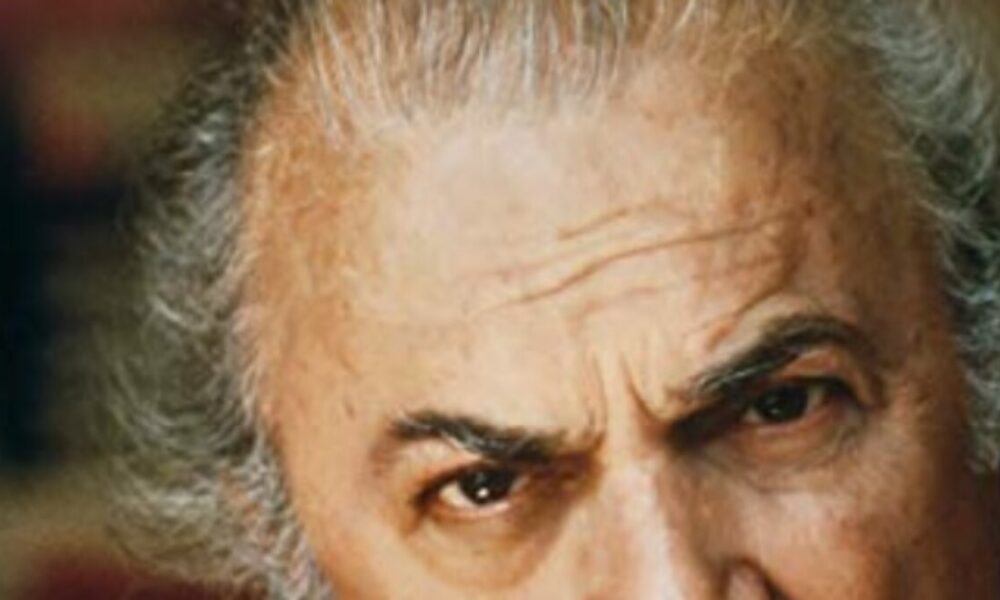
The name of Federico Fellini resonates in the history of cinema as a synonym for creativity, dreams and visual memory. Born on January 20, 1920 in Rimini, Italy, Fellini became one of the most influential directors of all time, known for his distinctive style that blended fantasy and realism, developing an unmistakable cinematic language that left an indelible mark on the world. world of the seventh art. With a career that spanned from the 1940s until his death in 1993, Fellini experimented with different forms of visual and thematic narrative. Over the years, he showed the world his peculiar universe, for which he received numerous international awards such as five Oscars, including the honorary statuette for his career. His filmography reveals an intense pursuit of self-reflection and introspection, which he embodied in works that often seemed to blur the lines between reality and fantasy.
Fellini's best films
Variety Lights (Luces de Varietés, 1950)
Fellini's film production begins with Variety Lightsa film co-directed with Alberto Lattuada. This film immerses itself in the atmosphere of the world of traveling show business. It introduces the public to the themes that would be recurring in Fellini's work: show business and its shadows, passion and disillusionment. Although it is less known and does not yet present all the stylistic complexity of his later works, Variety Lights It is essential to understand its beginnings and creative evolution.
The White Sheik (The White Sheik, 1952)
Under the protection of the production of Roberto Rossellini, The White Sheik sees Fellini take on the solo directorial role for the first time. Here the 'Fellini style' begins to be defined, combining the comic with the pathetic when portraying the tribulations of a young provincial couple in Rome. The film satirizes the romantic illusions fueled by the popular graphic novels of the time, a recurring theme: the clash between reality and dreams.
The street (1954)
The street It was the film that established Fellini internationally. Winner of the first Oscar for Best Foreign Film in 1956, transports us with its shocking narrative about a naive girl sold to a rude street artist. The masterful interpretation of Giulietta Masina, the director's wife, like Gelsomina, adds an extra layer of humanity and lyricism to the story. This film established Fellini's emotional and poetic universe, with characters located on the margins of society struggling to find their place in it.
The Bin (Souls without conscience, 1955)
Although less famous than many of his other titles, The Bin, which follows a group of con artists taking advantage of rural faith and hope, is crucial to understanding the filmmaker's ethical and stylistic arc. With a melancholic tone, crucial to understanding the introspective evolution of the director, this work invites us to reflect on themes such as repentance and redemption.
The Nights of Cabiria (The Nights of Cabiria, 1957)
Continuing with his exploration of the human soul through helpless female characters, Fellini creates The Nights of Cabiria. Again starring Giulietta Masina in the lead role, this film portrays a Roman prostitute in her relentless search for her true love. With a unique mix of pathos and humor, this acclaimed film achieved another Oscar for Best Foreign Film for Italy.
The sweet life (1960)
Without a doubt one of his most emblematic and influential works is The sweet life. The term has entered popular parlance to describe a hedonistic lifestyle inspired by the film. The film follows the adventures of journalist Marcello Rubini through a series of meetings in Rome in the sixties, being proportionately fascinating and critical of a society subjected to spectacle and empty escapism. The famous scene where Anita Ekberg bathes in the Trevi Fountain remains one of the most iconic moments in world cinema.
8½ (1963)
Legitimately considered by many as a gem of self-reflexive cinema, 8½ It is perhaps Fellini's artistic apogee. Starring Marcello Mastroianni, who plays an alter ego of the director himself, this magnum opus explores creative tribulations and memories from a surreal point of view. Awarded two Oscarsincluding best foreign film and best costume design, 8½ is frequently extolled not only as a pinnacle in the director's career but also as one of the greatest achievements in the entire history of cinema.
Amarcord (1973)
Projecting nostalgic reminiscences and grotesque scenes inherent to the Fellini universe, Amarcord, which means “I remember” in the Romagna dialect, represents both a geographical and temporal return for Fellini. This film is a semi-autobiographical chronicle about his youth in Rimini during the Italian fascist era. With its inimitable mix of humor and melancholy, personal memories and audiovisual spectacle, this work received a favorable reception internationally, even winning a Oscar more for Best Foreign Film.
About Federico Fellini
What were Federico Fellini's main influences?
Federico Fellini was influenced by several sources throughout his career. In his early years he was marked by Italian neorealism—led by figures such as Roberto Rossellini y Vittorio De Sica— focusing on portraying realistic post-war social pictures. Other important influences include the circus and Italian variety music—from which she would draw many archetypes for her characters—as well as Jungian psychology and personal mythology. He was also greatly influenced by his extensive collaboration with composers such as Nino Rota and designers like Piero Gherardi.
What does “Felliniesque” mean?
The term “Felliniesque”, derived from the director's last name, has come to denote any situation or sequence that has a dreamlike or surreal quality similar to that seen in his films. It is often used to describe scenes that swing between the fantastic and the grotesque.
Opinions about Federico Fellini
Various film personalities have expressed their admiration for Federico Fellini. The American director Martin Scorseseknown for his passion for film history and especially for Italian cinema, has said: «Fellini represented something special to me personally — he always knew how to express the dimensions of cinematic art». On the other hand, the Japanese director Akira Kurosawa commented about Fellini: “He is a unique artist with a very characteristic world — each of his films is like a fable looking directly at the human heart.” The opinions cover different cinephile spheres but they all agree on one thing: Fellini has marked a before and after in world cinema.
It is unquestionable that Federico Fellini not only forged an amazing path within the seventh art but also transformed how the depths of the human experience can be explored through cinema. From his neorealist works to his surreal introspective odysseys that explore the deepest corners of the soul and human dreams, Fellini not only created films; he created immortal worlds that will transcend future generations.
Source: https://www.cinecritico.net/director/peliculas-fellini/


